Genre: Board Game Developer: BS Comp Ltd. Publisher: Padis Ltd. Players: 1-2 Released: 1998
The origins of Chess are shrouded in mystery: The ancient game itself, and also, this unofficial Genesis release, which was popular in Russia in the late 90’s. Chess itself traces back at least 1,500 years, to ancient India and Persia. That much is known, but the specific details are lost in the mists of time, including who exactly invented it, where, and how.
Genesis Chess similarly has mysterious origins. While there is a credits screen with a handful of names, there is practically nothing known about anyone, including the developer and publisher companies, who have very little presence on the web. There is also practically nothing known about the development process: Some people think its ROM was probably taken from a Sega Channel-exclusive version of The Chessmaster. Then again, they might be completely different games: No one seems to know for sure, because that Sega Channel title has never yet resurfaced as a ROM, or even screen-shots. The graphics of Chess do not resemble The Chessmaster as seen on other consoles, like SNES, but that series’ title was applied to many different games, so the different graphics are not really an indication either way. (If Chess was, in fact, based on that Sega Channel title, then all traces of The Chessmaster series were cleanly removed.)
I’m convinced that Chess is unrelated to Sega Channel, and that it was developed from the ground-up in Russia. Not only are the graphics different from The Chessmaster series, but everything is also different about the gameplay details too. For example, The Chessmaster series has the hand floating smoothly over the board. Here in Chess, the hand rather jolts from one square to another, which is slightly less pleasant, but still perfectly functional.
The Chessmaster games also have a smooth system of taking back moves, and replaying moves – or in other words, “rewinding” and “fast-forwarding” through the moves that have happened. Chess does not have such a function, exactly, but its options are functionally equivalent. If I want to review past moves, I just look at the written list of moves that have happened. This has the benefit of forcing me to become more familiar with reading standard chess notation, which is a good thing, because I always need more practice at it!
While moves can be taken back, they can’t be automatically replayed, so the player and the CPU will have to actively make each move again. And the CPU can be rushed, so it can be a fast process if the player also moves fast. So for example: If a player wants to “rewind” 10 moves, and then “fast-forward” those same 10 moves. In the Chessmaster series, it works just like a VHS tape, with rewind and fast-forward. But in Chess, we can only rewind those 10 moves, and then actively make the next 10 moves again. It might be almost as fast, but it’s still not the same process, and there’s a chance that the CPU might even make moves that are different from before. So I don’t try to recreate the typical take-back/replay functions, and as mentioned, when I want to review past moves, I just read the written list of moves that have happened. So the lack of traditional take-back/replay is not considered a problem, as the written list is perfectly sufficient for reviewing details of the game.
For such quirks, I don’t hold them against Chess or its developers. This was an unofficial title, which presumably means it was created with limited resources and time. So, I consider the fact of it being an unofficial release as giving a pass to small quirks which don’t really affect the gameplay.
At first, there seems no way to force the CPU to move instantly (when it’s thinking about its next move), but eventually I realized that there is such an option; there’s just no visual indication of it! When the CPU is thinking, it can be forced to move (almost) instantly by tapping C. When it works, the pause screen comes up (which is already the normal function of the C button). This means that the CPU’s thinking-time was just cut short, and upon returning to the board, it will move immediately. This works, but there’s no clear indication that it’s being rushed, and the number of times that C needs to be pressed to make it happen, is unpredictable. The CPU seems to make sure it spends enough time to settle on a good move, and then it can be forced to move, but not before it finds a really good move. This is to the credit of Chess and its developers: On top difficulty, the CPU never seems to make a bad move, ever, which means that the artificial-intelligence is just incredible! This literally must be the smartest Genesis cartridge ever made.
It’s not only a steep challenge, it seems to play chess just about perfectly, and flawlessly… to the extent that such terms can be applied to chess, which is always open-ended gameplay, that can be done in different ways. Also, technically, the ancient game has never been perfectly solved by any software, even today, in 2017. But for all intents and purposes, this cartridge does seem to play chess flawlessly when set to top difficulty. It turns the Genesis into a chess supercomputer, so this is a great way to practice and learn “the best game on Earth.”
Chess generally lacks the glut of options that The Chessmaster series is known for. There is no “teaching mode” to highlight the squares that each piece can move to. There is no option to turn the pieces invisible. As is probably obvious, the lack of such options is not a detriment, because such options are not really needed in the first place.
Options here do cover all the basics, though, and most won’t be used very much, besides the choice of perspective (2D or 3D), and the difficulty setting. I stick to the top difficulty (which is 12) since I want a strong challenge, and at this setting the CPU can take a few minutes to think, before making its moves. It takes less time for easier moves, like the first opening moves, but then it usually takes four or five minutes per move. This is similar to playing against people in real life, who take a few minutes to think before moving. It gives ample time to analyze the board thoroughly, plus to leave and do other things while playing Chess, like maybe cleaning the apartment, or making dinner, etc. Chess works great while multi-tasking in one’s immediate surroundings. (Plus, as mentioned, the CPU can be forced to move almost-instantly, by tapping ‘C.’)
Play as either color, play on either side of the board, and flip the view of the board at any time. Customize the board arrangement and then play it. Hints are available for most moves, by clicking on the question mark in the bottom-right corner, and these hints are surprisingly good advice. There is two-player mode to play against a friend, although this option will probably never get used that way, because if a friend is in the same room, then a physical chess set is always best. Two-player mode will probably be better appreciated for the ability of one person to play chess against himself (controlling both sides), which is a classic way of practicing and learning.
There is also a choice for the CPU to play against itself, which should be showcasing some smart gameplay, and we might learn a thing or two, by watching it. The CPU can be chosen to take over for one’s own game at any time, plus the title screen launches into demo chess matches that continue indefinitely, match after match. This demo sequence is really cool, and also seems to set it apart from the world of official releases, where attract modes are usually not very involved. At first, I wondered if these demo games were following a predetermined set of moves, but it rather seems that the CPU is truly playing chess against itself. It’s not playing at its best, though, or else it would be taking a few minutes per move, so we’re actually watching speed matches, with its skill level compromised. Also, it seems that sometimes, one AI opponent has a higher skill level than the other, so if their skill levels keep changing, that would explain why these matches are unpredictable, with new gameplay always being generated. The player-selection is also funny. Playing against the CPU is called “Human–Sega,” while choosing the CPU to play against itself is called “Sega–Sega.”
The sound effects are slightly odd, which may further suggest that it’s a completely original title. One’s own moves are always silent, even captures, and putting the opposing king in check. Meanwhile, the CPU’s moves always make the same little electronic tune, whether it’s just a move, or a move with a capture. There’s a threatening tune for when one’s own king gets checked. And there’s a checkmate song, which is the same regardless which side wins, it just always sounds like a sad losing song, which is funny. (The silence of moving one’s own pieces could also be considered an interesting choice aesthetically, since there’s no absolute need for sound effects, and chess might just as well be played in silence.)
Default settings include background music, but the single looping song gets old fast, and it’s a pleasure to turn it off. It can get distracting from contemplating the chessboard, plus it sounds like it belongs in a more action-packed puzzle game, like Columns or something. The pause screen has calm elevator-music. The one other song is the title screen’s crazy theme song, which sounds harsh and abrasive, yet cheerful and exciting. On the pause-screen, turning the sound to “Partial” is the best choice, because it turns off the music, and leaves on the sound effects.
Chess works well in every way, and its small quirks are acceptable as an unofficial title, which also makes it even more impressive that they programmed such great artificial-intelligence. The graphics are clear, and 3D mode is well-drawn, though I have trouble seeing the board properly, with all the straight lines seen as diagonals, and with the pieces overlapping. This perspective should be great if someone can still make sense of the board properly. But I’ll be sticking with 2D mode because it’s very clear, if unremarkable, plus it nicely shows all the captured pieces on the side. This must be the only chess set I’ve seen with red-vs.-white pieces, but these colors are fine, and blood-red is actually a nice look for the “black” pieces. The board has a nice faint wood-grain pattern in both 3D mode and 2D mode.
It’s interesting to reflect that (aside from that doubtful Sega Channel connection): The user-base of Chess was originally limited to Russia in the late ’90s, so the masses there were busy playing chess on Sega Genesis, while the rest of the world was going crazy for new consoles and games like Super Mario 64! Incredibly, the rest of the world never saw any chess release at all for the Genesis, so the Game of Kings had no chance on the console, outside Russia. Ironically, the world did receive official chess titles for Sega CD, Game Gear, and Master System, but these titles are all lacking compared to Chess’ impressive artificial-intelligence.
More than any other game on Earth, chess is a lifelong process of learning and practicing, so a repro of Chess makes the Genesis relevant for a lifetime, as a nice training tool. While there are now almost two decades of newer chess programs, which must offer a tougher AI challenge to play against: I think any tougher challenge would be practically indistinguishable from the steep difficulty that we already find here, on Sega Genesis! (Note: After this review was first published, there were comments about certain slight limitations that others noticed in its AI, like the CPU sometimes repeating certain sequences of moves in different matches. While it’s very interesting to note such slight limitations and quirks of the AI, such things were apparently common for chess software of the time, in general, so I don’t hold it against this title. Also, it’s safe to say that most players will not be noticing any such limitations in its gameplay, and Chess will provide a healthy challenge for years.)
As a historical footnote: 1997 saw the famous event known as Deep Blue, which was the first time that the world’s best chess player was defeated by a computer. In previous years, the world’s chess champions had played against computers, but they had always won. IBM’s Deep Blue supercomputer then defeated world champion Kasparov, to mark a new age of computers that are officially smarter than humans!
However, the validity of the match is debatable, as Kasparov claimed that Deep Blue’s gameplay changed during the tournament and became more difficult… which could mean that IBM employed secret human chess players, to feed moves into the computer! In that case, Kasparov didn’t really lose to a computer at all, he would have just lost to a room full of expert chess players, who were group-thinking the best moves against him. As far-out as that conspiracy-theory is, it’s rather implied by Kasparov’s charge that the gameplay seemed different in later matches. IBM was later requested to show off their fancy computer but instead, they dismantled it, so no one could ever validate how advanced it was! Considering all that, I’m inclined to trust Kasparov’s hunch that there was something illegitimate about Deep Blue. Regardless, 1997 stands as the historical marker of computers officially becoming better at chess than people, and this is the context for Chess‘ unofficial release in 1998. It’s of the first wave of chess software that’s potentially smarter than humans, right here on our favorite 16-bit console!
Chess holds up great, and it always will. I highly recommend buying it as a repro cartridge as the solid chess release that the Genesis never received in most of the world but should have. A custom label will usually look great on the cartridge and box, and it will probably look better than most official releases because chess itself is such a beautiful and elegant game, which lends itself to nice artwork/photography. Even if someone doesn’t have a general interest in repro’s, Chess still belongs as a repro, in everyone’s Genesis collection.
Finally, here are some additional notes about my score. When first published, this review was controversial for granting it a 10, so it warrants some explanations.
There are many aspects which I find cool or interesting about Chess, including its murky origins, its original limitation to Russia, and the typical beauty of its custom artwork as a repro. When first writing the review, I considered all these aspects as part of the big picture, and therefore part of its score. Some readers responded that all these aspects can be argued as irrelevant to its score, which should be based on just the gameplay, only. And they do have a point because some people won’t care about any of those aspects.
So, I’ve reflected on it, and here’s my honest conclusion. The gameplay itself can be judged completely removed from everything else, yet I’m still scoring the gameplay a 10, because it offers years of practice and skill improvement, which leads to years of better performance in real-life chess matches.
Video games usually are not related to real-life skill sets; for example, playing NBA Jam doesn’t help us shoot better hoops at the park, and playing Sonic 2 doesn’t help us run faster around the block. But playing Chess does help us play better chess at the cafe, so we can beat our friends more often! In fact, this is the only Genesis cart I can think of that helps us learn a real-life skill set, besides that Miracle keyboard program (which lets us practice and learn to play keyboard). Just like I’d consider it legitimate for someone to rate the Miracle keyboard a 10, for the only way to spend years practicing and improving one’s keyboard skills with a Genesis. Likewise, I consider it legitimate to give Chess a 10 for the only way to spend years practicing and improving one’s chess performance with a Genesis.
For further context: I’m rating it a 10 as an active chess player who has indeed used this repro as an occasional training tool the last few years, and I expect to keep doing so, for years to come. Most chess players need some kind of regular training tool in between live matches, and this repro makes the Genesis a choice to fill that need. Today, most folks might use websites like chess.com to fill that need. There are also always chess books to study, and a person can even practice and learn with nothing more than a physical chess set (playing against oneself and controlling both sides). Among all these options for regular practice, I’m grateful that the Genesis is a choice for that purpose. Because sometimes I’d rather play chess with a wireless infrared Genesis controller, instead of those other options, like playing chess with a mouse, on PC.
The 10 doesn’t mean the game is absolutely perfect. Rather, it means the gameplay is very solid and educational, with no substantial flaws, and I consider a repro as a “must-have” for everyone’s collection. Repros are not expensive; I bought my cart-only for $15. So, even if someone has no interest in chess, but he collects for the Genesis. Chess still makes sense as a “must-have” because repro’s are cheap, and they look great on display.
For those who disagree with this review, there’s definitely room for a Double-Take article to explain their reasons for judging it lower. For example, someone could complain about its slightly odd sound effects and music, but then the author might need to justify why the ancient game would need impressive audio, in the first place? A physical chess set doesn’t produce music or sound effects, so my perspective is that the audio is generally irrelevant. Also, as mentioned, I consider Chess’ slight quirks as getting a pass because it was an unofficial release. So, a Double-Take could argue that the slight quirks are not acceptable, regardless that it was an unofficial release, with impressive AI (as the one aspect that really matters).
Originally, I think my review overstated its lack of typical take-back/replay and gave an overly negative impression. While it can look cool to “rewind” and “fast-forward” through one’s moves in most chess video games: It’s not a function that’s actually needed, so its lack here is not considered a problem, especially that the written list of moves serves the same exact purpose (i.e. reviewing the moves). The written list can even be argued as more beneficial because it improves our familiarity with reading/using standard chess notation, a skill that many chess players always need more practice with. So if people do consider it a problem that it lacks typical take-back/replay, it’s not for a lack of comparable functions, so it begs why it should be considered a problem. If someone just prefers to review past moves by watching them animate, rather than reading them, it’s fine to hold such a personal preference. But it’s an arbitrary preference, as the written list serves the same exact purpose, so I’m not holding it against this title.
Another aspect that readers mentioned is that Chess can be compared more broadly to titles on other platforms, like SNES. This is a good point and would be good content for a Double-Take. However, I just haven’t played chess on SNES, and I think it’s fair enough for a review to approach this as the only chess title on Genesis, plus comparing it as superior to all official releases in the Sega universe of the time (on Sega CD, Game Gear, and Master System). While I’m sure SNES must have a nice version of The Chessmaster, I wouldn’t expect its AI to be any better because Chess has very solid AI, and any slight quirks (of its AI) are considered common for chess software of that time. (Plus, the SNES title came out in 1991, a full seven years earlier than Genesis Chess, and this alone could imply that Chess’ AI is probably more advanced.) SNES’ Chessmaster probably does have music and sound effects that are more normal, as part of a big-name series, but those are the kinds of details that I don’t hold against Chess as an unofficial release, and because such details are not really important for chess, anyway.
Finally, there were some responses that seemed to take issue with any chess game ever receiving a high score, as if chess itself is just too boring to ever deserve a high score, and of course I have to disagree. I know that chess might look boring, because it can involve a lot of thinking time, but that’s actually because there are so many different actions and dynamics to imagine, before making each move.
Chess is a war simulation, with 32 men covering half of the 64 squares, each with their own moves and attacks, so it’s actually exciting and suspenseful. I hope everyone gives chess a chance at least a couple times in their life, because they might see why it’s amazing and profound. For example, if a friend or relative plays chess, then sit down with him, and try it sometime. There are any number of ways to try chess for the first time, and thanks to this title, the Genesis is one of those choices. So this title works for practically anyone with an interest in chess, of any level of experience, hence its high score.
While some folks simply have no interest in chess, in general: I don’t consider that as a criticism against chess, or chess video games, which I consider as meant for those who are interested in the ancient game. I don’t consider chess games (or any genre of games) as being obligated to persuade people who are not interested in their genre!
I’m rating Chess as functional, challenging, and educational for practically anyone with an interest in the Game of Kings, offering years of practice and skill improvement, leading to better performance in real-life chess matches.
Buy a repro in the mail, then enjoy beating your friends more often in the coming years, which is priceless.
SCORE: 10 out of 10

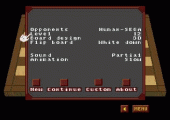
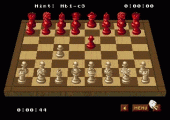
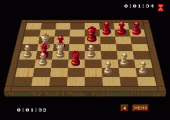
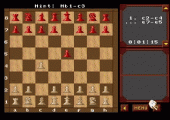
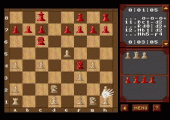
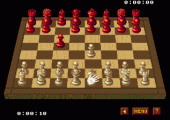
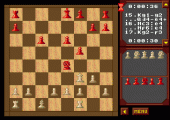
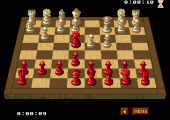
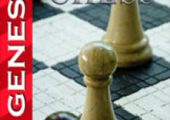
Recent Comments